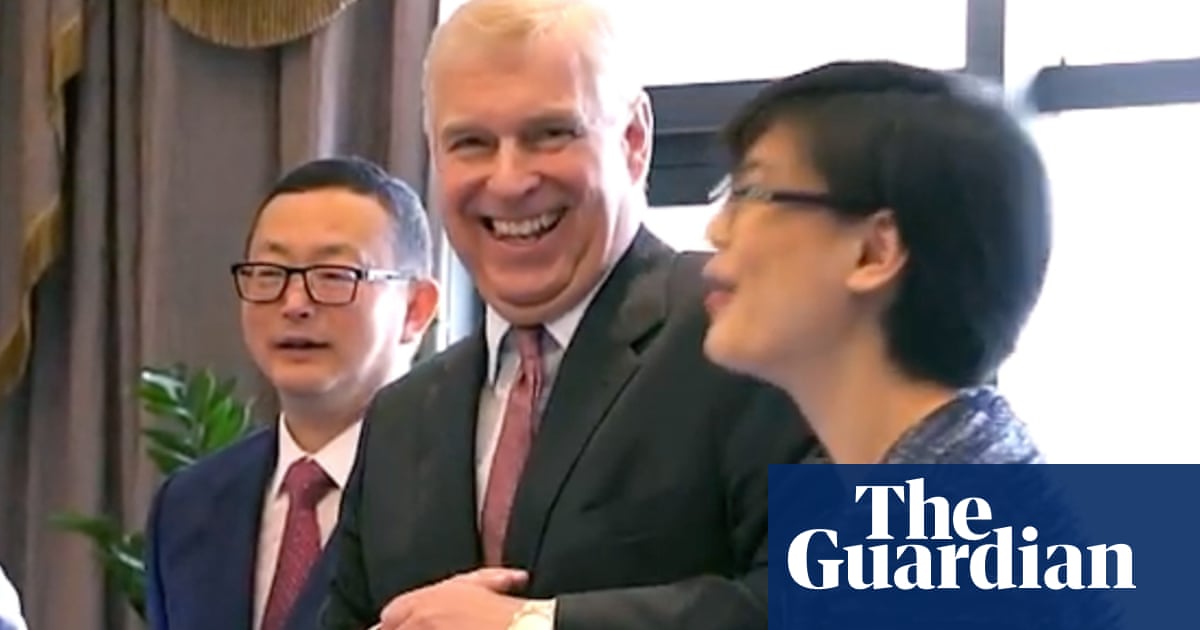
The Duke of York sent letters directly to China’s president, the prince’s former senior adviser told a special immigration tribunal, with an alleged Chinese spy advising him on how to write them.
Dominic Hampshire, who worked for Andrew from 2019-22, said Andrew had “always had a communication channel” with Xi Jinping that was “accepted” and may even have been encouraged by Buckingham Palace and the late queen.
Yang Tengbo – also known as Chris Yang – who has previously said he had “done nothing wrong or unlawful”, was excluded from the UK on national security grounds by the then home secretary, Suella Braverman, in March 2023.
He unsuccessfully challenged the decision at the Special Immigration Appeals Commission (Siac) last year, with judges finding the businessman was a “close confidant” of Andrew and had “won a significant degree, one could say an unusual degree, of trust” from the duke.
Documents in the legal challenge, including Hampshire’s witness statement, were made public on Friday following a request from several media organisations.
According to Hampshire’s statement, Andrew sent a letter each year on the Chinese president’s birthday. “The royal household, including the late queen, were fully aware of this communication – it was certainly accepted and it may be fair to say it was even encouraged – it was an open channel of communication that was useful to have.”
He added: “As is my job, I would draft these letters with the help of those (in this instance Chris) that understood how messages need to be conveyed due to cultural differences.”
Hampshire described the letters to Xi as “top-level ‘nothingness’ and a courtesy type of letter. For example, the duke sends a letter to the president for his birthday each year.”
His statement, made in May 2024, said Andrew “must surely be a valuable communication point with China”. “Whilst I think China would prefer a different royal, the reality is, to this day, that if the UK government or the palace said that someone needs to see the Chinese president and talk to him, I think the duke would be able to do that, whereas I don’t think anyone else could do so as simply.”
Hampshire said that, having known Andrew for nearly 20 years, and worked closely with him for five, he believed he was “deeply trusted” within the palace at “the highest level”. He said he had had two meetings in six months last year with Andrew and the king “to discuss what the duke can do moving forward in a way that is acceptable to his majesty”.
Hampshire said the Eurasia Fund was discussed with the king at these meetings. The Eurasia Fund was an investment vehicle, involving Andrew and Yang, which intended to use Chinese funds for renewable energy projects in Africa but never got off the ground.
Buckingham Palace said of Hampshire’s meetings with the king: “While his majesty met the duke and his adviser to hear outline proposals for independent funding over the past year, the individual known as H6 [Yang] was not mentioned at any time or in any way as part of these discussions.”
It is understood that while Andrew may have mentioned a number of proposals including the Eurasia Fund, it was not discussed in any level of detail with the king, nor did the king or his advisers give approval to this business relationship or opportunity.
Hampshire said Andrew’s reputation was “irrecoverable” after his BBC Newsnight interview with Emily Maitlis about his relationship with the convicted child sex offender Jeffrey Epstein. “This was a common feeling within the royal household, despite what the duke thought may happen. It was very clear internally within the royal household that we would have to look at options for the duke’s future away from royal duties.”
He said the duke’s Pitch@Palace initiative, set up to support entrepreneurs, was one of Andrew’s “indisputable successes” and there were hopes it would continue internationally. He added that Yang, who was the founder-partner of Pitch@Palace China, had not deserted the duke after the interview even while UK sponsors and supporters of Andrew’s initiative were “falling away”.
after newsletter promotion
In Yang’s witness statement, further details of which were also released on Friday, he said of Andrew: “Prior to 2016, the duke did not have a good reputation in China. But because of the work on Pitch he had succeeded in building up his personal brand and reputation in China.
“He was well regarded in senior circles and in Chinese media perception. After the Maitlis interview, the duke’s reputation in China was terrible.”
Hampshire said he was summonsed by the late queen’s private secretary, Sir Edward Young, and asked if he knew Yang, who had come to the attention of the security services. Hampshire said in his statement he told Young: “Chris is pretty much our only avenue for the duke moving forward and arguably the only light at the end of the tunnel for him. Do you have a plan B? Sir Edward said he did not.”
In the five years he had known Yang, Hampshire said there had “never been one single red flag in my head” about him, and in the “limited contact” Andrew had, the duke was “of the same opinion”. He added that Yang “categorically does not have a close relationship with the duke”.
After the documents were made public on Friday, Hampshire said he left the royal household in 2022 and no longer provided advice to Andrew. He said Andrew “fully complied” with advice to end all contact with Yang.
“For the record, as soon as the Duke of York was advised to cease all contact with Mr Yang, he fully complied,” Hampshire said in a statement. “He did not receive a penny in funding or support, directly or indirectly, from any Chinese individual or entity.”
Yang has previously said he intends to appeal against the decision upholding his ban from entering the UK.
Source: theguardian.com

















